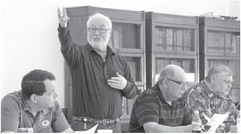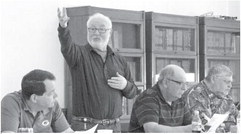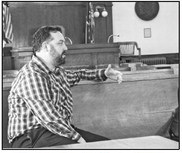County committee term limits make sense


A proposal to set term limits for county board standing committees makes sense and should be put into the county code in some form.
At last week’s county board reorganization meeting, supervisor Mike Bub raised the proposal as a way to ensure a more equitable distribution of power among county board members and by extension their constituents. Bub observed that during his tenure on the board there has been very little turnover in the make-up of the committees. This, combined with there being very little turnover on the board as a whole, means that year in and year out the same handful of people serve on each committee.
This is not overly unusual for legislative bodies. Members of the state legislature or Congress may spend their entire careers serving on the same handful of committees.
What separates the county board from these other groups is the dual role of the board filling both the executive and legislative functions for the county. Not only does the board set policy, but through the direct oversight of department heads by powerful committees has control over how those policies are carried out.
The purpose of committees, in general, is to allow for greater specialization and focus by the individual supervisors. This is aided by having stable and long-term membership on the committees.
Where this becomes a problem in Taylor County is that the full board meets only a handful of times each year. As a result, most decisions are made at the committee level and involve only a small number of supervisors with the others having little input or impact on the decisions reached. There is also concern that over time, as committee members work closely with the department staff, the relationship shifts from being one of oversight into becoming something of a cheerleader for those departments.
Bub’s proposal would seek to address these concerns by setting a limit of 14 consecutive years a member may be on a committee and eight consecutive years as a committee chairman. By any measure, this is a generous allotment of time which would provide ample opportunity for members to gain insight and expertise into how the departments function.
The biggest hurdle to adopting the rule is when to start the clock for time served. Bub suggested it go into effect in the 2022 reorganization and include previous time served. Others, such as supervisor Lester Lewis, think the clock should start with the 2022 appointments. Given the average ages and terms of service of many existing board members, waiting another 16 years for changes to committee membership will see more turnover due to attrition than through a conscious plan to share power.
The challenge will be how to balance sharing power on the committees with maintaining continuity in the departments. To that end, Bub’s proposal make sense, as applied to the appointed versus elected committees and opens the door for greater distribution of decision making power to all areas of the county.





